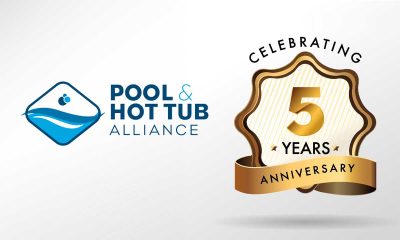Talking Pools
Insights From Skimmer’s 2024 State of Pool Service Report
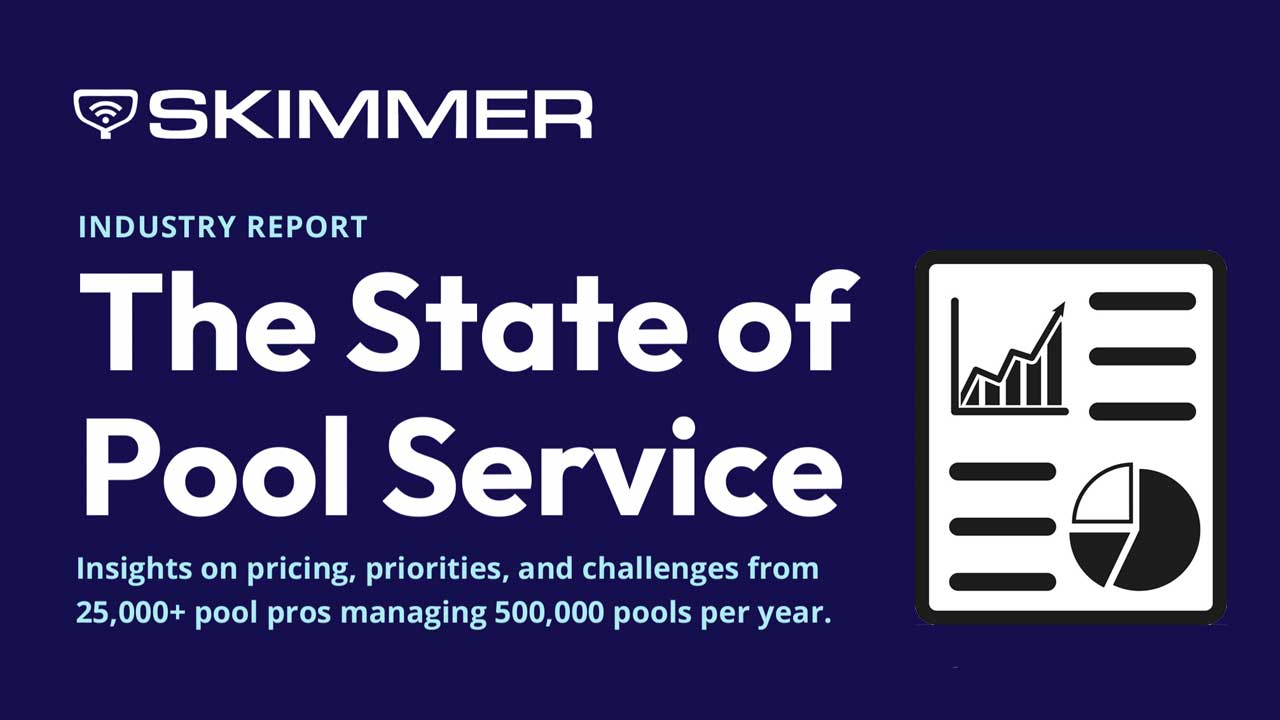
Skimmer, a leading-edge pool service software provider, recently unveiled its “2024 State of Pool Service Report,” a comprehensive analysis based on the invaluable feedback from over 1,700 pool service professionals who responded. This report delves deep into key facets of the industry, such as market challenges, business structures, pricing strategies, technology adoption, and growth plans. Notably, the report culminates from survey responses from Skimmer’s platform of over 25,000 users as well as insights gleaned from broader market research.
Rising Tides of Costs and Strategic Business Responses
One of the more eye-opening aspects to the report, 73% of surveyed pool service professionals reported a commendable upswing in revenue in 2023 compared to the previous year. However, the buoyancy in revenue was tempered by a prevailing concern – rising costs. The majority identified escalating costs as the most formidable challenge faced in 2023, with an anticipatory nod to this trend persisting into the unfolding year of 2024.
A significant number of companies are gearing up to address these rising costs by contemplating price adjustments, with nearly 74% of pool professionals signaling their intention to implement price increases in the current year to sustain revenue streams.
In an exclusive interview with Talking Pools Podcast, Jack Nelson, CEO of Skimmer, underscored this critical issue, stating, “Everyone in the industry feels like costs are going to keep rising. It’s unfortunately an inevitability with sort of inflation. The question is, what are we going to do about it? It’s really interesting to see that most respondents said they were planning on raising prices in order to maintain profit margins.”
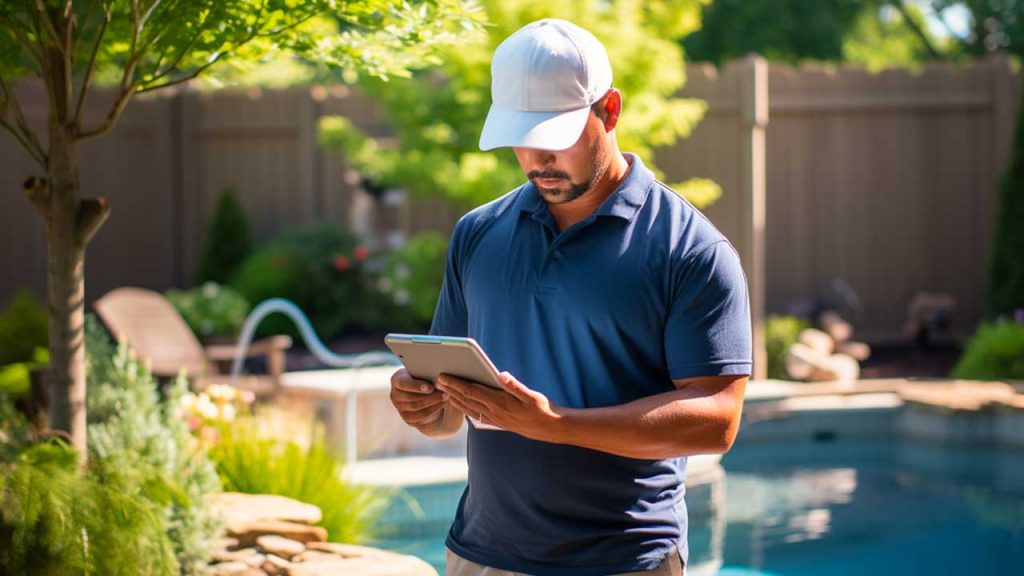
Workforce Dynamics and Marketing Strategies
Beyond the realms of financial strategies, the report casts its gaze on the dynamic workforce within the pool service industry. A noteworthy revelation is that 52% of respondents expressed an intent to expand their teams in 2024. This metric supports a positive indicator that most respondents believe the industry will continue to grow rather than contract.
One statistic you may find surprising, the report indicated that the majority of service technicians still rely heavily on the age-old method of word-of-mouth referrals, with only a modest 35% reporting that they’re investing in marketing. Nelson, who has experienced this sentiment first hand expressed that this way of thinking might be outdated.
“So many folks in the industry think they don’t need to pay for marketing because they get a lot of referrals,” said Nelson, “that’s true. You can grow your business that way, but you can grow it so much more quickly if you are spending a little bit of marketing. Because most of the industry is still not doing it, there’s a real chance to kind of take advantage of that. It’s a huge opportunity for ambitious pool service companies.”
Technology Integration: The Digital Oasis
In counterpoint to that, one area where the pool industry is embracing technology is business operations. One pivotal aspect of the report indicated an escalating integration of technology within the pool service industry. Approximately 75% of respondents revealed that they are leveraging software to streamline various aspects of their business operations. This underscores a growing acknowledgment of the pivotal role technology plays in enhancing efficiency, streamlining operations, and staying ahead in a competitive landscape.
“I think knowing your numbers is absolutely critical,” said Nelson, “so is embracing technology to operate your business more efficiently. That’s true whether it’s Skimmer or any other type of technology. I think there’s a tendency to underestimate the cost associated with doing business. Time is money. If you’re accepting a check from a customer because that customer refuses to get on ACH or credit card, there’s time associated with that cost. I think really understanding where you can automate different aspects of your business to save time and money is critical as costs continue to rise.”
Strategic Navigations for Future Growth
One noteworthy observation gleaned from the report is the success of companies that choose to bill separately for chemicals. Businesses charging customers separately for chemicals were on average more profitable than those who opted to include chemicals in the total price of service.
Including the price of chemicals has traditionally been a more straightforward, fixed-rate structure that is perhaps more easily grasped by pool owners and simplifies billing for pool professionals. However, the drawback lies in the susceptibility to frequent price adjustments due to significant fluctuations in chemical costs.
According to Skimmer’s data analysis, the model that charges extra for chemicals, known as the “plus chems” model, emerges as the most effective strategy in mitigating the impact of both fluctuating chemical costs and variations in weather patterns that might affect chemical usage, providing a robust buffer against such uncertainties.
Beyond immediate challenges, the report reveals a spectrum of strategic approaches pool service professionals are exploring for future growth. Notably, 33% of respondents expressed a nuanced interest in reducing their customer count while concurrently focusing on upselling more services and augmenting the overall value provided per pool serviced. Additionally, 43% are pinning their hopes on introducing operational efficiencies to curtail costs and bolster profitability.
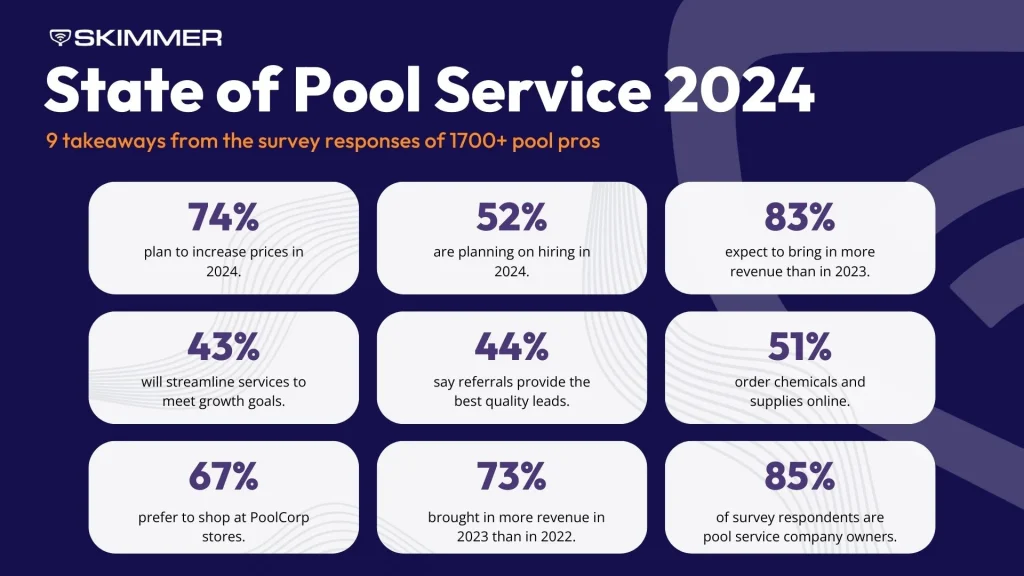
Want to take a deeper dive? Read Skimmer’s 2024 State of Pool Service Report or listen to the interview on the Talking Pools Podcast.
Talking Pools
Pseudomonas, an Emerging Threat in Swimming Pool Diseases

Water, the essence of life, can harbor imperceptible perils in the form of waterborne diseases. Within the United States, a multitude of cases of waterborne infections are contracted annually, imposing a substantial toll on public health. Pseudomonas and the RWIs (recreational water illnesses) derived from them are one concern in particular that swimmers need to be aware of.
What is Pseudomonas?
Pseudomonas is a type of bacteria, specifically the genus Pseudomonas, which includes various species. One of the species within this genus that is relevant to RWIs is Pseudomonas aeruginosa. Pseudomonas aeruginosa is a common environmental bacterium that can cause infections in humans under certain circumstances. It is known to be an opportunistic pathogen, meaning it primarily affects people with weakened immune systems or those who are already ill.
When it comes to swimming pools, Pseudomonas aeruginosa can be of concern because it has the potential to cause a condition known as “hot tub rash” or “hot tub folliculitis.” This condition is characterized by itchy and sometimes painful red bumps or rash that develop on the skin after exposure to contaminated water, such as in hot tubs, pools, and water playgrounds.
The reasons why Pseudomonas aeruginosa can become a problem in swimming pool settings include:
- Warm Water: Pseudomonas bacteria thrive in warm water environments, which are often found in heated swimming pools and hot tubs.
- Moist Environment: The bacteria can survive and multiply in the moist environment of swimming pools and hot tubs, especially if proper water disinfection and maintenance practices are not followed.
- Insufficient Chlorination: Inadequate disinfection, usually due to low chlorine levels or poor maintenance of chlorine levels, can allow Pseudomonas bacteria to proliferate.
- Lack of Circulation: Stagnant water areas or poor water circulation can create pockets where bacteria can grow.
- Contaminated Water Sources: If the water supply to the pool or hot tub is contaminated with Pseudomonas bacteria, it can lead to infections among swimmers.
- Lack of Hygiene: Swimmers who don’t shower before entering the pool can introduce bacteria and other contaminants into the water.
A revolutionary study titled “Assessing the Burden of Waterborne Infectious Diseases by Exposure Pathway in the United States, 2014” has illuminated the magnitude of this concern, particularly concerning diseases emanating from swimming pools. This piece delves into the pivotal discoveries of the research and spotlights the profound insights shared by microbial physiologist Roy Vore and chemist Jenn Huang in an exclusive two-part episode of the Talking Pools Podcast on July 28, 2023.

The Startling Statistics of Pool-Linked Diseases
The study’s staggering figures reveal that in 2014 alone, the United States witnessed an excess of 7.15 million instances of domestically acquired waterborne infections. Tragically, these infections culminated in 120,000 hospitalizations and 6,600 fatalities. Such data underscores the exigent necessity to effectively address waterborne diseases.
A key facet of the study was the meticulous breakdown of disease incidence according to diverse exposure pathways: recreational water, potable water, and non-recreational non-potable (NRNP) water. Recreational water, encompassing pools, hot tubs, and natural water bodies, constituted the source for approximately 5.61 million illnesses, securing its place as the predominant exposure route.
Potable water, drawn from public systems, private wells, or commercial containers, accounted for around 1.13 million illnesses. NRNP water, employed for non-leisure activities like agriculture or medical applications, contributed to roughly 407,000 instances of waterborne ailments. Acquiring a comprehensive understanding of these exposure routes is pivotal in directing preventive actions and optimizing resource allocation.
The Role of Biofilms
The study also underscored the prominence of biofilms in waterborne infections. Biofilms form as thin layers of microorganisms on diverse surfaces within water systems, such as pipes and filters. Pathogens ensconced within biofilms present formidable challenges for eradication, serving as a substantial source of infections.
Insights from the Experts
In the episode of the Talking Pools Podcast, microbial physiologist Roy Vore and chemist Jenn Huang shared invaluable insights. They emphasized the necessity for water management initiatives to combat the proliferation of pathogens within biofilms, particularly within recreational water venues. Additionally, public health campaigns are pivotal in averting biofilm-related diseases and safeguarding community well-being.
Learn more at CPOClass.com:
https://cpoclass.com/swimming-pool-diseases/
Talking Pools
It’s Time to Recession-Proof Your Pool Business

We hate to be the one to say it, but the time has come to make some changes and recession-proof your pool business. We’ve been riding a wave that’s been an incredible boom for the industry. People have stayed home during the quarantine, and the money they would have spent on vacations has become disposable income that they’ve used to reinvest into the home. Home improvements are up in general during the pandemic and the end result has been nothing short of unprecedented in terms of growth for the pool industry.
Over 94,000 pools were installed during 2020, up 21% from the previous year in 2019. The numbers aren’t in just yet for last year but as the dust still settles from 2021, the entire pool industry has boomed.
This year, the complexion and outlook does not appear to be a repeat of the previous two years in terms of demand. Right now we’re looking at high inflation. Increases in fuel costs are soaring through the roof. We’re on the brink of a recession. Hopefully, I’m wrong but I’m not the only one that thinks this way. Supply chain shortages are just ongoing and something we’ve been plagued with since the very start of the pandemic. At some point in time, the momentum is going to stop.
Some folks had disposable income and used that towards home improvement. Others took out loans and mortgages. Many feel the inevitable crash is coming, and for those who are unprepared the change in the economy will hurt, perhaps irreparably.

There are a few things that pool professionals need to consider in order to recession-proof their business. I think one may be coming within the next year. Hopefully, that doesn’t happen. Hopefully, you never need to use any of this advice in this article. However, there is absolutely nothing wrong with putting yourself in a good position to handle a recession, and it looks like one may be on the horizon.
Ways to Recession-Proof Your Pool Business
There are different things you can do to arrange things so that you’re in a better position financially if a recession happens in our country. This may mean raising prices with customers, but you need to make certain you’re in the best position possible to survive tough times should they occur.
Split Chemicals as an Itemized Bill From Services
One great idea to recession-proof your pool business is to start billing separately for chemicals. With more price increases on chemicals looming in the near future, it simply makes sense to begin to start passing these costs on to the consumer. It’s an unsustainable business practice to continue to absorb rising costs. Pool companies cannot continue to take it on the chin the way we have.
Now is the time to explain the prevailing market conditions to the consumer and perhaps change your business practice for billing customers. In our roundtable discussion last year, we discussed rising prices. Not much has changed in the last 6 months except perhaps consumer confidence. Instead of continuing to raise prices for service, what makes more sense in this climate is to separate chemical usage as an itemized bill.

Change Your Billing Practices
Another aspect of billing that should change during this climate is charging for service after it’s been rendered. Many pool companies have their act together in this regard and are doing the right thing by billing for services ahead of time, however, there are still many professionals who do not. Billing ahead ensures that you are cash solvent enough to pay employees, for inventory, equipment, and materials. Failing to do so leaves you at the mercy of the customer.
Billing after the fact is tantamount to supplying customers with a credit line on every job you do. This is a surefire way to fall behind during a recession. As customers begin to become cash strapped during this economy, one of the first bills they’re liable to ignore is yours! Pool service professionals run the distinct possibility of becoming low priority when it comes time to pay bills, especially when the service has already been rendered.
How Do You Switch Your Billing to Recession-Proof Your Business?
One question pool professionals who bill at the end of the month is, how do they switch? How do you switch to billing at the beginning of the month without double billing? People by nature are resistant to change, they also don’t like paying in advance. So the question remains, how do you switch the way you’ve been billing without upsetting all of your customers?
The answer is – incrementally. Make the change slowly and begin retraining your customers to expect a bill earlier than they have. There’s not a recession today, there probably won’t be one this summer; but if what industry experts are predicting is true, one is coming soon and the time to adapt is now!
Get Ahead of the Game
This month coming up, instead of billing on the 30th for the service you’ve performed all month, start billing on the 3rd week. Then the next month, bill your customers on the second week. By the end of the summer, you should be caught up and now be billing all of your customers for the month of service ahead.
It’s important to be transparent to customers. Explain what you’re doing and why. Using this method of billing allows the customer to become slowly acclimatized to paying their bill earlier. In just a few months’ time, you will have effectively changed your entire billing practice and insulated yourself much better financially in the process.
Build Your Credit
Heather Linton also spoke on another episode of “Talking Pools” about building credit for your pool company. While pool professionals may be cash-rich right now, the time to start building your credit is now. Simply put, people need money when a recession hits. If you have not been building your business credit, do not wait until a recession hits. During a down economy is when consumers make the biggest run on banks. It’s also when credit is hardest to come by.
At the end of the day, when considering ways to recession-proof your business, it’s important to put together a game plan that allows you the flexibility to maneuver in tough environments. Some of these suggestions may seem hard to implement, but are entirely necessary in order to ensure you remain solvent in a down economy. In the last two years we’ve seen unprecedented growth, but now is the time to make sure that we stay in a good place financially during the tough times to come.
Listen to the entire episode on the Talking Pools podcast:
Op Editorials
What Should I Be Charging For Pool Service?
Why lowball pricing your competition isn’t always the best strategy

We were having a conversation earlier in the Talking Pools Facebook Group about what to charge for Pool Service. People were discussing the problem of new pool service companies undercutting the market and coming in at a lower price.
Many folks were suggesting that when you do that you open up the doors to shoddy service. Ultimately they said that operating on price alone; companies have a propensity to do a bad job and disappoint their customers.
One of the people we were speaking with said that as a new company, it was harder for them to compete against seasoned well-established pool service firms. Since they were less experienced they felt the need to have to compete based on price alone.
Now see, here’s a perfect scenario where someone is projecting their own lack of knowledge and lack of self-worth into commoditizing pool service. If you’re sitting there and wondering to yourself, “What would I pay for pool service?”, does it really matter what you would pay? You’re not your customer. Comparing what is in your budget to what is in theirs is a recipe for disaster.
When you look at your pricing, what you would pay for something should not even factor into the equation. Your pricing should be based on what the market will bear.
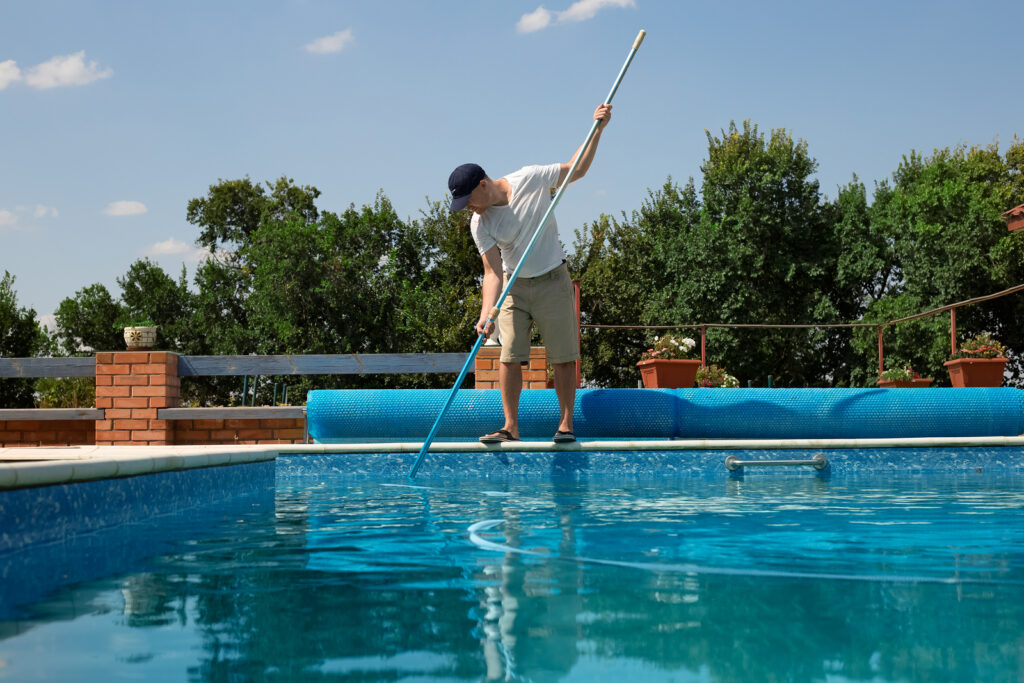
Establish What You Should Be Charging For Pool Service
The best way to figure out what you should be charging for pool service is to research pricing in your market. Do a competition survey and find out what your competitors are charging and just average it out. Whether you’re in the high-end or in the low-end you should still be pricing your services at an average of what other companies in the market are charging.
Why It’s a Bad Idea To Low-Ball Pool Service
Customers have become used to seeing advertisements for discount pool cleaning services. Many have been paying low prices for decades because new companies start up in their area all the time.
New firms want to get their business going as quickly as possible so they undercut everyone in the market to build up their route as fast as they can. They charge as low as they can and do as many pools as they can. Consequently, everyone suffers.
Discount Pricing, An Unstainable Business Model
What happens when you try to be the lowest price in your market is a combination of the following. You’ll find yourself working harder than ever, doing 100 pools a week to keep up with what you sold. This isn’t sustainable.
Before long, companies find themselves skipping steps, cutting corners and providing nominal quality that will eventually lose them the account. The customer then wants to pay $70 to the next company that comes along.
The cycle repeats itself as new companies enter the market following the same flawed strategy until eventually, the consumer perception of what pool service is supposed to cost has been drastically diminished. This is a practice that has to change for the good of everyone in our industry.
Listen to our entire conversation on the topic on the Talking Pools podcast. What are you charging for pool service in your market? Sound off in the comments and let us know your thoughts.
-

 Pool News4 weeks ago
Pool News4 weeks agoLandslide Damages Homes, Destroys Swimming Pool in California
-
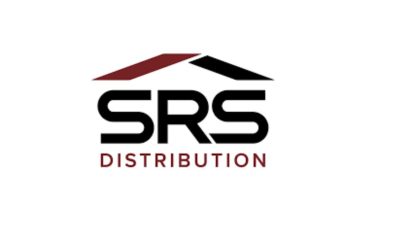
 Manufacturer2 weeks ago
Manufacturer2 weeks agoSRS Distribution Announces Next Phase of Growth by Combining with The Home Depot to Better Serve Professional Customers
-

 Pool News4 weeks ago
Pool News4 weeks agoFluidra Launches €20 Million Venture Capital Fund – Fluidra Ventures
-
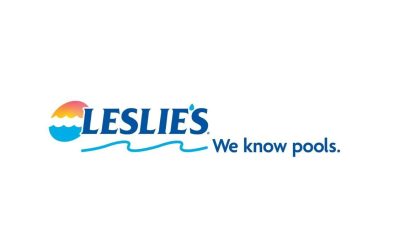
 Cleaning and Service Equipment and Supplies2 weeks ago
Cleaning and Service Equipment and Supplies2 weeks agoRecent Leslie’s/Harris Poll Study Shows Nearly Three-Quarters of Americans Mistakenly Assume Clear Pool Water Is Clean, Swim-Safe Water
-

 Manufacturer4 weeks ago
Manufacturer4 weeks agoBofA Downgrades Latham Group Citing Weak Pool Construction Market
-

 Pool News2 weeks ago
Pool News2 weeks agoHotel Pool Had Numerous Violations in Case Where 8-Year-Old Was Pulled Into Pipe
-

 Pool News5 days ago
Pool News5 days agoEarthquake in Taiwan Causes Waterfall From Rooftop Pool
-

 Equipment Supplies3 weeks ago
Equipment Supplies3 weeks agoFWP Faces Class Action Lawsuit Stemming From 2023 Cyberattack


